Helen H. Moore's Blog, page 710
July 23, 2016
How low can the bar go? Donald Trump’s RNC is historic for all the wrong reasons
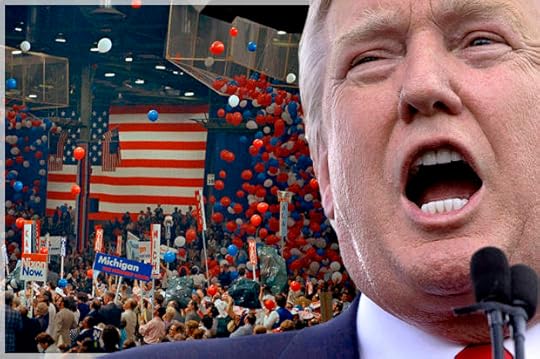
Donald Trump; The 1972 Republican National Convention in Miami. (Credit: AP/Carolyn Kaster/Photo montage by Salon)
“What we were looking for was something that would put the nation and the rank and file of the Party on the alert to the fact that our leading candidate was impetuous, irresponsible, and slightly stupid.”
These words were spoken not about Donald Trump and his nomination at the Republican National Convention of 2016, but regarding Barry Goldwater, who in 1964 was the last GOP presidential candidate to seize the party from the establishment. Then again, they just as aptly sum up the underlying significance of Trump being officially nominated. Even though Trump is easily as much of a threat to the country as Goldwater was believed to be fifty-two years ago (if not more so), his hostile takeover of the Republican Party seemed foreordained. Its 1964 counterpart, on the other hand, seemed uncertain until the last minute and eventually broke out in violence.
At a time when we’ve been distracted by Melania Trump’s plagiarized speech and her husband’s call for a “law and order” campaign, the most remarkable story of this week may very well be that such a patently dangerous man was officially nominated for president … but with a whimper, not a bang.
Make no mistake about it, Trump is a very dangerous man. Oddly enough, one of the main dangers about Trump isn’t being widely discussed — namely, the fact that he is clearly mentally incompetent to be president. As Tony Schwartz, the writer who ghost-authored Trump’s famous book “The Art of the Deal,” observed to The New Yorker, Trump “has no attention span … It’s impossible to keep him focussed on any topic, other than his own self-aggrandizement, for more than a few minutes.” As he later pointed out, “if [Trump] had to be briefed on a crisis in the Situation Room, it’s impossible to imagine him paying attention over a long period of time.” When you add this to the number of prominent therapists who have stated Trump displays textbook narcissistic personality traits, serious practical questions emerge about his mental fitness to occupy the Oval Office.
There is another dangerous aspect to what Trump has done. To the extent that he has an ideology, it is the simplistic one of a man who is prone to sweeping generalizations … and who likes to create scapegoats. Think of the conspiracy theories with which he has been prominently identified — from insisting President Obama wasn’t born in this country and never attended Columbia University to claiming that Ted Cruz’s father had been involved in John Kennedy’s assassination. When his fringe proclivities aren’t simply bizarre, they become hateful. The man who would build a wall to keep out Mexican rapists and criminals and ban all Muslims from entering America starts out by referring to them as monoliths — the Hispanics, the Muslims and so on.
So how come the man’s nomination has been inevitable? Why has he been at the top of the polls since he launched his campaign last year, and then swept through the primaries like an unstoppable force until his nomination last night became a matter of course? How could our political climate have allowed such a thing to happen?
Part of it is that, in the half century since Goldwater took over the Republican Party, that organization has grown increasingly comfortable in the world of overt racism. Polls already indicate that Trump supporters are more likely to hold bigoted views about racial minorities than any other group in the GOP, and this is no coincidence. A direct line can be drawn from Trumpism to the racism embedded in much of the Tea Party’s opposition to America’s first black president or to the coded language used to win elections by Republican presidents like Richard Nixon and Ronald Reagan. In this respect, he is as much a product of modern Republicanism as he is its albatross. That said, as Mitt Romney astutely pointed out on CNN’s “The Situation Room,” Trump has lowered the bar to a new depth, since “presidents have an impact on the nature of our nation, and trickle down racism and trickle down bigotry and trickle down misogyny — all of these things are extraordinarily dangerous to the heart and character of America.”
By contrast, our willingness to minimize the danger posed by a potential Trump presidency is rooted in the overall political zeitgeist. As Bob Woodward once explained in “Shadow: Five Presidents and the Legacy of Watergate,” Americans had gradually lost faith in their presidents as scandals and abuses of power became increasingly frequent in the years after Watergate. Trump’s own chief opponent, Hillary Clinton, has made matters worse with a string of scandals in her own background, the most conspicuous of which resulted in the FBI declaring that “there is evidence that they were extremely careless in their handling of very sensitive, highly classified information.” My guess here is that, at a time when so many have lost faith in the character of those who govern us, it’s easier to not see the difference between corruption and a very different and far more threatening alternative, genuine stupidity (which often comes with bigotry). Ironically, Trump has plenty of his own corruption allegations, but I suspect these are just being lumped in with his myriad other problems. In the end, we may elect a mentally incompetent man to be president for no other reason than our desensitization to loathing our leaders.
That’s why, when the meaning of Cleveland is discussed in history, I suspect observers will marvel at how the ugliest corruptions in America’s political soul ate itself alive. It didn’t gnash its teeth (at least not yet) or make a scene. Indeed, by the time people realized what was happening, it was too late to stop it. Now all we have to do is hope that, now that the Republicans are putting an “impetuous, irresponsible and slightly stupid” man in front of the American voters, they won’t make the world-changing mistake of electing him.
July 22, 2016
The Tim Kaine Effect: What does Hillary Clinton’s VP pick bring to the race?
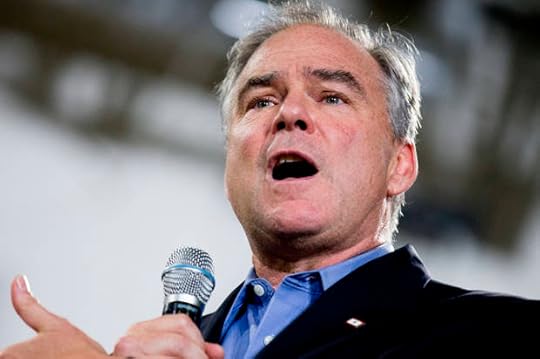
Tim Kaine (Credit: AP/Andrew Harnik)
It’s official: Hillary Clinton’s 2016 running mate is Tim Kaine. The New York Times reported the news late thus evening, citing a senior campaign official. The Virginia senator had reportedly been Clinton’s top pick going down the stretch, and he’s long been viewed as the “safe” pick for Hillary: he’s a relatively moderate middle-aged white guy from a swing state and he speaks Spanish. Kaine reportedly narrowly missed out on being Barack Obama’s running mate in 2008, but now he’s finally made it to the big stage.
So what does Kaine bring to the ticket? Well, he has a ton of experience in politics and elected office having served Virginia as senator, governor, and lieutenant governor. He was chairman of the Democratic National Committee a few years back and has a close political relationship with Barack Obama, who nearly picked Kaine as his own running mate back in 2008. And he hails from a swing state, which theoretically should help nudge Virginia’s electoral votes into Hillary’s column.
What Kaine doesn’t do is excite the Democratic Party’s restive liberal base. Kaine isn’t a gormless moderate in the Evan Bayh model, but he’s certainly not the first choice of progressive activists who had hoped that Bernie Sanders’ vigorous challenge to Hillary in the primaries would have impelled her to pick a more left-wing running mate. His record on abortion issues is a bit muddled (Kaine supports pro-choice policies even though he describes himself as “personally” opposed to abortion) and he recently irked progressives by signing two letters supporting deregulation of large and small banks. Kaine also favorsexpanded U.S. involvement in the Syrian civil war, which dovetails with Clinton’s call to establish a no-fly zone over the war-torn nation.
At the same time, Kaine does have a record of progressive activism he can draw from. As Mother Jones’ Patrick Caldwell wrote in his recent profile of Kaine, the senator is “driven by the gospel of social justice” and spent his pre-political career as a civil rights attorney fighting against housing discrimination in Richmond. He did missionary work in Honduras and he provided legal representation to death-row inmates. Even still, he’s not going excite the party’s left wing in the way that Elizabeth Warren or Sherrod Brown would have.
In fact, would-be vice president Kaine isn’t really going to excite anyone. He’s not an ideologue, and he’s certainly not an attack dog – Kaine tried taking a few swipes at Donald Trump last week, and the meanest thing he could come up with was to call Trump a “trash talker.” He’s an unassuming and quietly accomplished public official. By selecting Kaine, Hillary is making it clear that her overriding priority is projecting an image of competence
Hillary Clinton chooses Tim Kaine as her running mate
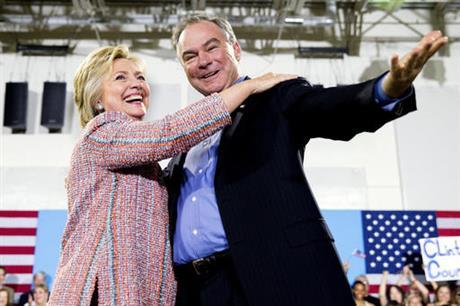
In this July 14, 2016, file photo, Democratic presidential candidate Hillary Clinton, accompanied by Sen. Tim Kaine, D-Va., speaks at a rally at Northern Virginia Community College in Annandale, Va. Clinton has chosen Kaine to be her running mate (Credit: (AP Photo/Andrew Harnik))
ORLANDO, Florida (AP) — Hillary Clinton named Virginia Sen. Tim Kaine as her vice presidential running mate Friday, adding a centrist former governor of a crucial battleground state to the Democratic ticket.
In a text message to supporters, the presumptive Democratic nominee said, “I’m thrilled to tell you this first: I’ve chosen Sen. Tim Kaine as my running mate.”
On Twitter a few seconds later, Clinton described Kaine as “a man who’s devoted his life to fighting for others.” She called him “a relentless optimist who believes no problem is unsolvable if you put in the work to solve it.”
With the pick, Clinton moved into the political spotlight a day after newly crowned Republican nominee Donald Trump closed out his convention with a fiery address accusing his general election opponent of “terrible, terrible crimes.”
Kaine, 58, had long been a favorite for Clinton’s ticket. Fluent in Spanish and active in the Senate on foreign relations and military affairs, he built a reputation for working across the aisle as Virginia’s governor and as mayor of Richmond.
In a recent interview with CBS News, Clinton noted that Kaine has never lost an election during his lengthy political career and praised him as a “world-class mayor, governor and senator.” A favorite of Barack Obama since his early 2008 endorsement, the president told Clinton’s campaign he believed Kaine would be a strong choice during the selection process, according to a Democratic familiar with the search who was not authorized to discuss it publicly.
Those views are not shared by some liberals in the Democratic Party, who dislike his support of free trade and Wall Street. They pushed Clinton to pick Massachusetts Sen. Elizabeth Warren or Ohio Sen. Sherrod Brown, intensifying their criticism of Kaine late this week as his selection appeared imminent.
Clinton’s campaign largely declined to comment on the search process, trying to keep the details — even the names of the finalists — under wraps to try to maximize the impact of their announcement. She made no mention of her impending pick during a somber meeting Friday with community leaders and family members affected by the Pulse nightclub shooting in Orlando and a later campaign rally in Tampa.
She is expected to campaign with Kaine on Saturday morning at an event in Miami.
As Clinton prepared to make her VP pick Friday, Trump met with supporters at his convention hotel in Cleveland to run through a long list of thank-yous after the end of his four-day coronation as head of the Republican Party.
But rather than stay focused on Clinton or reach out to the general election voters he now must court, the newly minted Republican nominee spent considerable time stoking the fire of his bitter quarrel with Republican former rival Ted Cruz. “Ted, stay home,” Trump said, dismissing any interest in an endorsement the Texas senator refuses to provide. “Relax. Enjoy yourself.”
Trump boasted of his TV ratings, his primary victories and other achievements, including winning over his wife, Melania, in a stream-of-consciousness delivery with his vice presidential nominee, Indiana Gov. Mike Pence, standing quietly nearby.
“I don’t do anything unless I win,” Trump insisted. He promised to work “so hard” as the nominee and vowed his campaign was “not going to disappear,” even though he has no plans to campaign this weekend and no events on his schedule for next week.
No matter, perhaps, as that time will belong to Clinton and the Democrats, whose own convention begins Monday in Philadelphia. Kaine, who won election to the Senate in 2012 after serving as Obama’s first chairman of the Democratic National Committee, will likely speak in the slot reserved for the vice presidential pick on Wednesday night.
Before entering politics, Kaine was an attorney who specialized in civil rights and fair housing. He learned Spanish during a mission trip to Honduras while in law school, an experience he still references on the campaign trail. During his political career, he’s demonstrated an ability to woo voters across party lines, winning his 2006 gubernatorial race with support in both Democratic strongholds and traditionally Republican strongholds.
His wife, Anne Holton, is the daughter of a former Virginia governor, a former state judge and, currently, the state’s Education Secretary. The couple has three children.
Clinton selected him to join the ticket from a group of candidates that included Agriculture Secretary Tom Vilsack, Labor Secretary Tom Perez and Colorado Gov. John Hickenlooper.
Clinton’s plans to pick Kaine, hinted at for several days leading up her Friday announcement, had been viewed as a safe choice against the Republican ticket of Trump and Indiana Gov. Mike Pence.
Some Democrats believe Trump’s selection of Pence, a conservative white man from a largely Republican state, freed Clinton from pressure to add another woman or minority to her ticket. Her short list included Warren, two Latino cabinet secretaries and New Jersey Gov. Cory Booker, one of two black U.S. senators.
Democrats argue that Kaine could help her woo moderate and even some Republican voters turned off by Trump’s provocative rhetoric, which was at the center of his 75-minute Thursday night acceptance speech. Trump pledged to restore a sense of public safety, strictly curb immigration and save the nation from Clinton’s record of “death, destruction, terrorism and weakness.”
Democrats offered a different assessment of the state of the nation. Obama said Friday that Trump painted a picture that “doesn’t really jibe with the experience with most people.”
At a White House news conference with Mexican President Enrique Pena Nieto, Obama said crime rates, especially those for violent crime, are lower than at any time in the past 30 years. He noted violent crime has recently risen in some cities, “but we’re not going to make good decisions based on fears that don’t have a basis in fact.”
Kaine got some practice challenging Trump’s message when he campaigned with Clinton last week in northern Virginia, where he spoke briefly in Spanish and offered a strident assault on Trump’s White House credentials.
“Do you want a ‘you’re fired’ president or a ‘you’re hired’ president?” Kaine asked in Annandale, Virginia, as Clinton nodded. “Do you want a trash-talking president or a bridge-building president?”
Your Tim Kaine VP primer: 7 things you should know about Hillary Clinton’s running mate
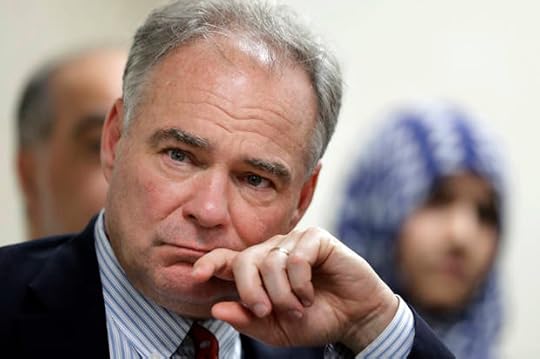
Tim Kaine (Credit: AP/Manuel Balce Ceneta)
Presumptive Democratic nominee Hillary Clinton on Friday announced Tim Kaine as her vice presidential running mate. Kaine is a more traditional (read: less progressive) politician than some of the other top picks, but also significantly less controversial. Here are some things you need to know about him:
Kaine is currently the junior senator from Virginia, having been elected in 2012 after Jim Webb retired. Before that he served as the governor, lieutenant governor, and mayor of Richmond.
He’s Catholic, but interestingly, still pro-choice. While he has previously admitted to having “a faith-based opposition to abortion” he also says, “Roe vs. Wade is ultimately about saying that there is a realm of personal liberty for people to make this decision” and “I don’t think ultimately we ought to be criminalizing abortion.”
One of the things that put Kaine over the edge in terms of a strong VP pick is the fact that he’s from Minnesota, but has served Virginia, which should help strengthen Clinton’s position in battleground states in both the South and Midwest.
He speaks fluent Spanish — he has delivered speeches on the Senate floor in Spanish.
Kaine supports strong action on climate change, decrying both climate change deniers and what he has termed “leadership deniers,” politicians who believe in climate change but don’t believe the U.S. should take a leadership role in reducing the world’s carbon footprint. “They say look, even if we reduce U.S. emission to zero, it wouldn’t offset world emissions unless China or India did something, and so let’s just not do anything,” Kaine said. “That is just not the American way, folks, for us not to lead on something important like that.”
He’s been married to his wife, Anne Bright Holton, since 1984. They met while at Harvard Law and she is currently serving as the Secretary of Education in Virginia. The couple has three children together.
Kaine is a member of the Senate Armed Forces Committee, and opposed the Obama administration’s efforts to use the existing Authorization for Use of Military Force to expand action against ISIS in Iraq. At the time, he wrote in the Washington Post, “Ultimately, the allocation of war powers is based on a value. The nation should not send U.S. service members into harm’s way unless there is a consensus among the civilian leadership — executive and legislative — that the mission is worth it. Ordering people to risk their lives without Washington doing the work necessary to reach a political consensus is immoral.”
Forever Captain Kirk: William Shatner opens up about “fandom frenzy” and 50 years of “Star Trek”
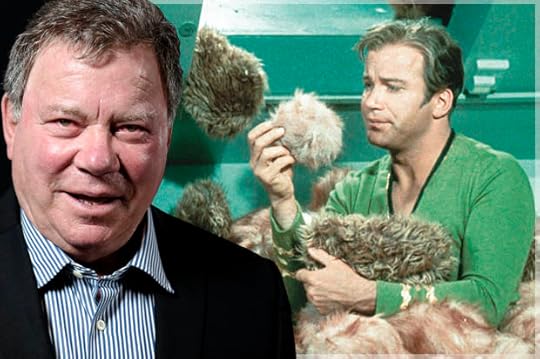
William Shatner (Credit: AP/Richard Shotwell/Paramount Television/Salon)
It’s a big year for “Star Trek.” The venerable franchise turns 50. Therefore, by association, it’s a big year for William Shatner, too.
No surprise, but the inimitable actor-performer-icon, now 85, shows no signs of stopping. He never has. Shatner’s life-long, scattershot approach to his career has kept his fans guessing — in both the positive and head-scratching senses of the word — for decades.
The new movie in the reboot series, “Star Trek Beyond,” starring that second-string cast (Chris Pine as Kirk, Zachary Quinto as Commander Spock, et al.), opens today. Shatner’s not in the film, technically (look for a tiny nod to him). “Star Trek” is mostly in Shatner’s past. But he’s not afraid to capitalize on the franchise’s half-century mark.
The Summer of Shatner begins at San Diego Comic-Con 2016 this weekend. Then he’ll stop at more than a dozen other fan conventions through the fall, from Las Vegas to Atlanta, Austin to Birmingham, U.K. In October, he takes his one-man show “Shatner’s World: We Just Live In It” — a performance of stories and songs from the “one man force of nature” — to several venues.
As a writer, Shatner has penned several science fiction novels and memoirs of his experience exploring the strange new worlds of Star Trek fandom. His most recent book, “Leonard: My Fifty-Year Friendship with a Remarkable Man,” was released earlier this year.
As a (sort of) singer and accidental spoken-word performance artist, he’s both butchered songs — who can forget “Rocket Man?” — and made impressive inroads into indie rock legitimacy after his collaborations with Ben Folds.
His early acting career began with classic Shakespearean training in his home country of Canada, then stints on American TV shows in the 1950s and early 1960s, such as “The Twilight Zone” and “Dr. Kildare” and movies like “The Brothers Karamazov.” During a 1970s post-“Star Trek” dry spell, he seemingly appeared on every show on television, from “Hawaii Five-O” to “The Six Million Dollar Man.” Later, he made a comeback on “T. J. Hooker,” which led to work on “The Practice” and “Boston Legal” that earned him Emmys and a Golden Globe. He’s been a voice talent for video games and cartoons and a Priceline spokesperson. He’s directed features and documentaries, from the exploration of “Trek” fans, “Get a Life!” to 1989’s “Star Trek V: The Final Frontier.”
However, to most fans, Shatner remains James Tiberius Kirk, captain of the U.S.S. Enterprise.
Seen as campy and over-dramatic to some, ever since NBC broadcast the first episode on September 8, 1966, “Star Trek” has arguably been eclipsed in the pop-cultural firmament by that other sci-fi juggernaut beginning with the word “Star.” Still, the Trek franchise was groundbreaking when it first appeared, ensnaring our dreams of space exploration and hope for a harmonious universe. Half a century and oodles of TV and movie iterations, conventions, fanzines and merchandise later, each generation continues to renew interest in all things Trek.
I caught up with Shatner as he was poised to begin his cross-country odyssey of comic cons and theaters and baseball. In a telephone interview, I successfully resisted the temptation to ask him, “In Episode 47, when the Rigelians steal the dilithium crystals, why didn’t the automatic engine sensors pick up the …”
Rather, what became clear was that Shatner’s still not slowing down. He’s still, in the immortal words of chief engineer Montgomery “Scotty” Scott, “givin’ her” — er, us — “all she’s got.”
What does the 50th anniversary of “Star Trek” mean to you?
Fifty years sounds like such a gigantic passage of time, and it really is. To give it even more import, it’s a half a century. It’s an extraordinary length of time. A full life could be lived in 50 years, and in fact, up until not so long ago, that was the average age that people dropped off at. So to have an event like “Star Trek,” a moderately successful show on the air 50 years ago, to remain in the public consciousness and for you and I to be talking about it 50 years later, is a phenomenon beyond belief, and I’m in a sort of non-believing state when it comes to “Star Trek.” Fifty years, although it sounds like a long time, from my point of view, is a flicker of an eye.
When you shot the original show back in 1966, did you have any sense “Star Trek” would last?
No more than if you thought that this interview would be quoted 50 years from now.
Some fans talk about how “Star Trek” appealed to them because it embodied hope for interracial, international, even inter-species, peace and cooperation. Others were taken by how the show seemed to address their anxieties or provide moral lessons and thought experiments about human behavior. Others were sucked in by the promise of the blank slate of space exploration. To you, what explains the attraction and longevity of the franchise?
I did a book on it. I called it “Get A Life!” The conclusion I gave was that people going to these conventions were going to see each other. Then I did a documentary with the same name some years later, and my due diligence turned up a more interesting and deeper explanation. And that is: science fiction is mythological. If mythology seeks to give a cohesive understanding of some strange event, like religion, then science fiction in general and “Star Trek” specifically seek to explain some of those weird things that we’re seeing in a microscope and a telescope, [things] so mind-boggling that it puts science fiction in a corner. What is in reality so mysterious and awesome and nobody can make any sense of it, science fiction writers try to make some little sense of it.
A lot of people have talked about the ways in which the original show was groundbreaking, including the first interracial kiss on television and some of the technology the characters used that has come to pass. How else was The Original Series groundbreaking?
It was during the Vietnam War, and there are many references to war and robots and killings by extension and man’s inhumanity. There were many insightful observations dramatized under the guise of alien culture. Although those kinds of stories are not groundbreaking in itself, being on television and being on a popular network was.
Now that you’re thinking about the 50th anniversary, I’m sure you’re also looking back on the great friendship you had with Leonard Nimoy [who died in 2015]. Partly I’m interested in hearing you talk about that because you’ll be coming to Boston Comic Con, in Boston, Nimoy’s hometown, later this summer.
In a way, Boston is my town as well. I married a beautiful Boston girl [Nerine Kidd, his third wife, died in 1999]. My beautiful Irish rose. So I knew Boston a little bit through her, and I’m very fond of Boston for having given me Nerine for the brief while that I was with her. I feel close to Boston.
When you come to Boston Comic Con in August, are you doing anything special with your time?
I’m gonna throw the ball out at a baseball game at Fenway on Friday evening [August 12]. I’m gonna throw a curveball that drops right at the plate.
Talk about your bond with Nimoy.
Leonard, his background and where he lived and how he was brought up and how he got into the business and his subsequent life, filled with life and death and divorce, echoed mine very closely. It brought us very close together, having so much in common. So as a result of being in each other’s company for so long, a vast part of those 50 years, we became very fast friends.
In a way, you’re sort of the elder statesman for the “Star Trek” franchise, especially with Leonard Nimoy no longer being with us…
The word “elder” is anathema. [Laughs]
My apologies.
I’m a statesman. I’m not anything. I’m not connected with “Star Trek” at all. There’s a new series and of course the movies, and I have no input whatsoever.
But do you feel that in some ways you’re still the face of the franchise and that you’ll always be known for your legacy as Captain Kirk, despite all of the other wonderful things you’ve done in your career? Does it feel like that’s how people will remember you?
Well if they do, that’s alright with me. [“Star Trek”] was a show business phenomenon, and why would I disparage that? From your point of view, I’m Captain Kirk and that’s it, but from other people’s, they refer to me in other terms. It’s come to be a conglomerate that comes out “Shatner” most of the time.
How did you get the role of Kirk?
I had done some popular work prior to “Star Trek,” in movies and in stage and even in television, so I was moseying along there pretty good, and I guess that’s why they came to me and tried to ask me to play in this thing. But nobody had any idea of the subsequent fame, and most assuredly as a result of playing Captain Kirk, you and I are talking today.
What was the period like between the end of the original TV series and the launch of the rebooted movie franchise, beginning with “Star Trek: The Motion Picture” in 1979?
The word that one hears is that if you’re popular on a series, it takes about two years to overcome that assignation. So I was in the middle of that two-year period — working gainfully in one thing or another, I’ve never not worked — but I wasn’t in a popular vehicle until the [“Star Trek”] movies came along, and then that began that whole phase [of my career].
You’re at this place in your career where you’ve seen everything, and as you said at the beginning of this interview, you never expected for all of this to have happened. What’s next for William Shatner, after your summer?
I’m doing a number of conventions. I’m also on tour with my one-man show [“Shatner’s World: We Just Live In It”]. I’m also going to shoot another year, I guess, of a series that hasn’t played on television yet called “Better Late Than Never.” It’ll be on NBC after the Olympics, and they’re excited enough to want to shoot another year, so I’ve put aside some time for that. I’ve got to go England and do my one-man show there. I am so busy I’m a little frightened by it.
What’s that experience like for you, travelling across the country meeting thousands of “Star Trek” fans, as well as performing your one-man show?
The original entertainers traveled by horse and buggy and they put up their tent and they were minstrels and they journeyed from one place to another. Now here I am going out and I’ve got a show every night of the week in a different venue for a week. I’ve been doing it for the last few years with my one-man show, and it sort of reminds me of the original intention of all actors, which was to entertain. And here I am, minstrel-like, going from city to city setting up my tent, in a theater this time, and entertaining for an hour-and-a-half with all the bells and whistles that I can get up in the air. I’m sort of hop-scotching all over the country this year because of the 50th anniversary.
What is your response to some of the more extreme forms of fan devotion, relating to “Star Trek” or otherwise — people dressing in costume? Fans who say “Star Trek” changed their lives?
We harness their energy.
You harness their energy? Can you talk more about that?
That’s off the top. Now you want me to [elaborate] on that? Now you want me to make that sound intelligent? [Laughs]
If you care to.
I harness their energy. The extreme end of any project is the spear point. That’s the thing that lands first. That energy, that extreme end of whatever it is, is what has to be dealt with first. That fandom frenzy, harnessed, is great fun.
Do you feel like the writing, directing, singing and other phases of your career were made possible by your success in “Star Trek,” or do you feel that you would have gotten to do those things had the show not happened?
No question. Captain Kirk and “Star Trek” has been the springboard for everything subsequent to that. Of course, one has no idea what would have happened. That’s one of the most formless of questions, “What would have happened?” because you don’t know. What happened is my journal of life, and what happened was I became popular because of the popularity of “Star Trek.” “Star Trek” gave me a chance to direct an expensive movie. I cherish that experience. “Star Trek” has allowed me to explore variations in whatever talent I have so that I’ve been able to produce some music and literature and even stand-up comedy, far more than having been an actor and saying somebody else’s words. “Star Trek” gave me the opportunity to see the world in a way that I wouldn’t have.
[NOTE: For space and clarity, this interview has been edited and condensed.]
Dear Eric Trump, I am not you: Life as the Doppelgänger of a Trump scion
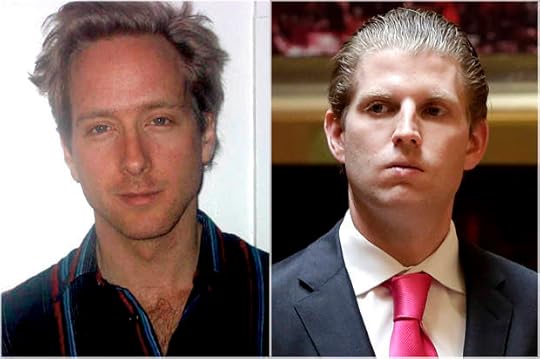
Eric Frederick Trump; Eric Frederick Trump (Credit: Courtesy of the author/AP/Richard Drew)
Dear Eric Frederick Trump:
My name is Eric Frederick Trump. Can I call you Eric? I feel I know you. We are in a long-term relationship, though only one of us, until now, has known about it.
There is something going on here. Something very strange.
Let me explain. For years, I have been fielding your calls and receiving your correspondence (no suspicious white powders, yet). Now is the glorious Summer of Trump, and I need to sort out this matter of nomenclature and apprise you of the dead letters that continue to arrive at my door and my inbox.
This is a true story. I swear I exist. I still have my birth certificate and am happy to release it. Or you can go to Amazon.com and look up “Eric Trump, verbs, German” (you have to be very precise if you want to find me). There, squashed between Daddy-T’s “Never Enough” and “Think Big: Make it Happen in Business and Life,” you’ll find my modest book, “501 Essential German Verbs.” (I said it was modest—and available for only $5.69!).
I know you, but you don’t know me. I think that makes me your Doppelgänger, your double, Hyde to your Jekyll, Latif Yahia to your Uday Hussein. We share more than a name. Like you, I have blond hair and blue eyes and live in New York. You’re taller, but my wife says I am better looking. My family comes from Germany (like your mother, mine has a suspicion-arousing accent), and my grandfather’s name, like yours, was Frederick.
My father is voting for your father. My father is high energy. My father is known for his argent hair. My father has said a lot of things. Your dad is angry. Mine sits alone and shouts at the news on TV. Many Americans find your father inscrutable. I still wonder who the man playing my father is.
Despite these similarities, we are not replicas. You belong to the one percent, while I dwell among the 99 percent (I took the royal road to peonage and studied literature). You command respect. My daughter’s pesky friends taunt me with “Your name is Eric Frederick Donald Trump.” They point to spinning cotton candy on July 4th and shriek with malicious glee, “Is that where your father got his hair?” You make business deals; I teach. You are a recognizable personage. I am lucky if my students know my name once semester ends. You’re the prince; I am the pauper who knows how to wield a semi-colon. People around the world search for you (I know because I have read their words), but they find me. Our name joins us. Our name threatens to erase me (go on: try googling “me”).
What’s in a name, you might ask. Papa Don goes by many Dononyms: Agent Orange, Orange Ozymandias, Cheetoh-faced, ferret-wearing shit gibbon (here we must protest in the name of gibbons everywhere). I have but one name. I would gladly doff it and say I am myself and not a Trump. Alas, I can’t Dump Trump, though it be my enemy. I’ve been shanghaied onto the Trump Train by my name. Your name. Our name.
I am your lightning rod, diverting the curious and the crazy from their target. Here’s what I mean:
When I lived in Manhattan, a woman with a slurred, unidentifiable accent who claimed to be my (your) mother left repeated messages on the answering machine, once even singing, “Happy Birthday Donald.” There was the man from Florida who called, praising your (our?) father, offering a brief business proposal, and concluding with a humiliating plea for money. A gardener in Morocco asked for business advice (I gave him the same counsel you would have: be kind and fair at all times).
A military officer and anti-terrorism specialist once wrote me an email asking if I am the Eric Trump (I said yes, I am the Trump who is a bit of a whiz at conjugating German verbs).
Did you take a trip to Mexico in the early 2000s? Someone sent swoony glossies of bright fish and azure waters to my apartment in Harlem. (Why she thought you were living incognito in a fifth-floor walk-up I can’t explain.)
Once I was in a New York hospital for minor surgery holding a binder with the name TRUMP written on it. A raspy voice called out: “Eric? Is that you?” I turned to see a supine, fading man. “Your father and I used to fight the goddamn unions together!” I hastened to correct him: “Oh, I’m not that Eric Trump.” He looked crestfallen: “Oh. Say hi to your father. He’s a great guy.”
People just want to believe in the presence of Trumpness.
These days, our last name isn’t just a brand. It’s a beacon. A baffled nation turns its fevered eyes to the orange light, seeking solace, answers. A rage commensurate with its own. I have run from my name and relocated to the Hudson Highlands. I know what you’re thinking: when’s the last time a Doppel was able to escape his Gänger? Like Harry Potter, who is pursued relentlessly by letters of acceptance to Hogwarts School of Witchcraft and Wizardry, the Trumpkins are finding me.
Exhibit A: Amy T., from the wilds of Pennsylvania, recently wrote a letter to “Mr. Trump,” a moniker that embraces you, DJT, and me. Now I am being doubly doppelgängered. She begins her epistle, which reads like a missile to crippled America: “DEMOCRAT NO MORE” and goes on to explain how Lyme disease, borne by a “disgusting, 8-legged, microscopic deer tick” (is this a veiled epithet for Hillary Clinton?), has “provided me with an unprovoked sentence of pain” (here, I think Ms. Thompson might be referring to something much larger and less precise than Lyme, like living in America). Mr. Trump, she continues, is the man to cure her and make things right because “well, I’m sure you have the answer to this…” At the last moment, Thompson’s rant recedes and the Letter to the Father becomes a billet doux: “With all due respect Mr. Trump…I love you, and love what you are trying to do for our country.”
Well, I’ve taken enough of your time. I trust you grasp the scope and urgency of this problem. For all I know, you are in the possession of love letters to me. They say it’s dangerous to meet your Doppelgänger in person. You might cancel me out more than you already have. Or we’ll dissolve into each other, like Narcissus and his reflection. I say we risk it. We can exchange our star-crossed correspondence and discuss a pseudonym for you. I suggest we meet at the 21 Club. I hear the Trump Burger is delicious.
Looking forward to it, mon semblable, mon frère.
Yours (Ours),
Eric Frederick Trump
How Mike Birbiglia and Keegan-Michael Key found common comedy ground: “He helped me ‘make less’ of it”
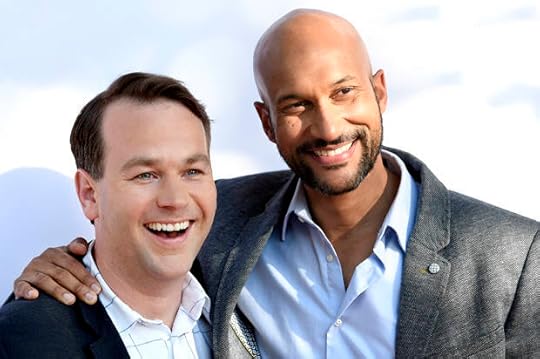
Mike Birbiglia, Keegan-Michael Key (Credit: AP/Chris Pizzello)
“Don’t Think Twice” is a sly, heartfelt comedy about an improv troupe called The Commune. Its founder, Miles (Mike Birbiglia), once had a shot at being on “Weekend Live,” a national sketch comedy TV show in the “Saturday Night Live” vein. While Miles is still waiting for his big break, two of his colleagues, Sam (Gillian Jacobs) and Jack (Keegan-Michael Key), get an audition for “Weekend Live,” and the tight-knit group starts to splinter.
Birbiglia, who wrote and directed the film, knows how to integrate various comedic forms in “Don’t Think Twice,” which relies on sarcasm, satire, physical humor and, yes, improv to give the characters depth as situations challenge them both personally and professionally.
But what makes the film so funny — and why it works so well — are the uniformly strong performances. Birbiglia allows his cast the freedom to develop a nice, easygoing rhythm that shows the characters as a cohesive unit but also gives the individuals private moments of doubt and self-acceptance. In particular, Keegan-Michael Key distinguishes himself as a pivotal member of the group who changes — both the most and the least — when his character gets a big break.
Birbiglia and Key met briefly with Salon to talk about comedy and their comedy, “Don’t Think Twice.”
Mike, as Miles tries to do with Jack on stage as part of the Commune, how hard was it to rein Keegan in from “showboating?”
Birbiglia: Ha! Keegan and I met over Skype and chatted for two hours while he was shooting “Keanu.” Artistically, we see eye to eye. I like to “make less.” [When] I met Robin Williams, I asked him about “Good Will Hunting” — he was so mesmerizing in that — and he said his performance was because of [director] Gus Van Sant. Gus would just tell him the line and Williams would figure out how to say it. That’s a great trick. It makes a film feel like the people are real. That’s what we tried to do. It was a lovely collaboration.
Keegan, how hard was it to play in an ensemble and not steal every scene?
Key: As Mike said, he helped me “make less” of it. I’ve not had a chance to do much of that of late. There was a natural energy … I tried, subtly, to make it as real as possible. That was the biggest reason for me to do this. It felt like home. My career had a 19-year detour from being a dramatic actor. “Don’t Think Twice” was an opportunity for me to use what I learned in school. I didn’t use the concept of Jack as a “bad guy” or that Jack has blinders on. Jack can’t think that. I asked: Does he think he’s ambitious? He’s doing the best he can. Does he have a secret shame? He’s not trying to be a bad guy. He’s not a ham-fisted antagonist.
Keegan, Jack has to audition for a show and he’s afraid of bombing. Can you tell me the story of an audition you did that bombed?
Key: Jordan [Peele] and I did a stand up gig. It was a performance we did as a team that was a kind of an audition for public appearances. It was a comedy jam outside San Francisco. Now, we are not standup comedians. I repeat. We are not stand up comedians. The venue was one of those festival concert amphitheaters with people on the lawn, etc. As the night progressed, the acts got bluer. And the audience got drunker and higher. The energy was markedly different when we were on, and our material was not as prurient. Two minutes in, we heard boos. The fourth or fifth minute, the boos were rolling in from the back of the hill. Our 20-minute set was over in nine-and-a-half minutes. We tried to get the crowd on our side. But, again, we are not stand up comedians.
Mike, what can you say about incorporating all of the different types of comedy into the film?
Birbiglia: Knowing the context [of humor] makes it real and funny. When Bill (Chris Gethard) misses a performance because he is dealing with a family crisis, Jack and Samantha announce they were scouted for auditions. They [hope to] alleviate Bill’s situation. It’s awkward, but it’s funny because Bill, who is suffering, asks, “The [scouts] came tonight?”
Mike, can you talk about how you got the players to work together as a group?
Birbiglia: The cast came together three weeks early to rehearse and do improv workshops with Liz Allen. They performed as an improv group. I want people to think The Commune is a real improv group — to come to New York and hope to see them. When we ran scenes, there were no bad ideas. We would try anything. But not on the day we were shooting, when we were bleeding $10,000 an hour. The actors weren’t shy. They were smart, open people. Whatever happened, happened, like the Trump impersonations.
Now that you guys are both successful, what would you say to the comics you performed with back in the day?
Birbiglia: Gillian [Jacobs] and I got that question at South by Southwest. Are we successful? It could all go away tomorrow. The key is to do what you love. Success is fleeting. It may not have to do with you but how your work is received. There is no such thing as #1 in art.
Key: There is no top. You are never going to reach the top if you go for success. That way lies madness. Do what you love in your community.
DNC emails: Wasserman Schultz furiously pressured MSNBC after it criticized her “unfair” treatment of Sanders

Debbie Wasserman Schultz (Credit: AP/Richard Drew)
Debbie Wasserman Schultz, the chair of the Democratic National Committee, was furious when she was criticized by MSNBC host Mika Brzezinski.
Wasserman Schultz called for Brzezinski to “apologize” and told her co-worker Chuck Todd “this must stop.” The DNC chair even complained to MSNBC’s president.
In May, Brzezinski held a segment on the program “Morning Joe” in which she condemned Wasserman Schultz’s “unfair” treatment of Bernie Sanders in the Democratic primary.
“This has been very poorly handled from the start. It has been unfair, and they haven’t taken him seriously, and it starts, quite frankly, with the person that we just heard speaking,” Brzezinski said, referring to Wasserman Schultz.
“She should step down,” Brzezinski added.
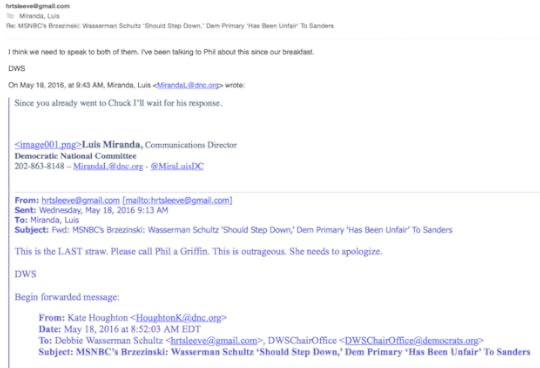
In a May 18 email, Kate Houghton, the director of the DNC chair’s office, forwarded a report on Brzezinski’s segment to Wasserman Schultz.
“This is the LAST straw,” Wasserman Schultz replied, enraged. “This is outrageous. She needs to apologize.”
Wasserman Schultz asked DNC Communications Director Luis Miranda to call Phil Griffin, the president of MSNBC.
Miranda responded noting that Wasserman Schultz “already went to Chuck,” a reference to MSNBC’s Chuck Todd, moderator of “Meet the Press.”
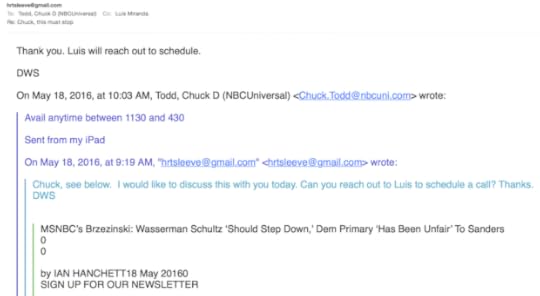
Wasserman Schultz sent another angry message to Todd titled, “Chuck, this must stop.” She included the link to the report on Brzezinski’s segment and wrote, “I would like to discuss this with you today.”
Todd replied noting he was available to speak with her. She thanked him and said Miranda would schedule a time to talk.
Wasserman Schultz was insistent: “I think we need to speak to both of them,” she wrote, referring to Chuck Todd and Phil Griffin, the MSNBC president.
She added, “I’ve been talking to Phil about this since our breakfast.”
WikiLeaks released approximately 20,000 DNC emails on Friday. Another email shows that Wasserman Schultz called the attempt by the Sanders campaign to moderate the party’s stance on Israel “disturbing.”
The DNC chair has long been criticized for anti-Sanders bias. Wasserman Schultz served as co-chair of Hillary Clinton’s 2008 presidential campaign, and is a longtime Clinton ally.
NBA teaches North Carolina a lesson: Gov. Pat McCrory learns that bigotry has consequences
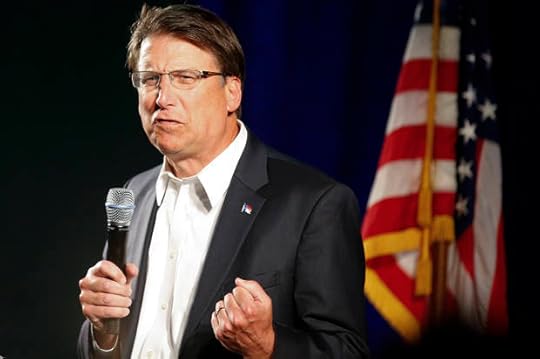
Pat McCrory (Credit: Reuters/Chris Keane)
It’s pretty hilarious — in a horrible, repulsive, you-remain-a-human-disaster way — when an arrogant bully boo-hoo-hoos upon the discovery that actions have consequences. It’s poetic when those who actively work to hurt others and rail about how everybody’s just so damn “sensitive” nowadays pitch the biggest tantrums when their feathers are ruffled. Poor babies!
On that note, feel free to bust out the world’s smallest violin this week for North Carolina Governor Pat McCrory, who had some fighting words Thursday after the NBA announced that it will move its 2017 all-star game from Charlotte. The league issued the statement that “Since March, when North Carolina enacted HB2 and the issue of legal protections for the LGBT community in Charlotte became prominent, the NBA and the Charlotte Hornets have been working diligently to foster constructive dialogue and try to effect positive change. We have been guided in these discussions by the long-standing core values of our league. These include not only diversity, inclusion, fairness and respect for others but also the willingness to listen and consider opposing points of view…. We do not believe we can successfully host our All-Star festivities in Charlotte in the climate created by HB2.”
Turner Broadcasting, which airs the game, soon after issued a statement of support.
HB2 is the state’s controversial law, passed last March, which tamped down any local movement to extend anti-discrimination regulations to members of the LGBT community, and prevents transgender individuals in government buildings — including schools — from using the bathrooms that correspond to their identity. In May, the ACLU challenged the bill and asked the state to block the enforcement of it, saying it is a source of “ongoing and serious harm.”
The fallout was felt quickly — and the whining soon followed. In April, North Carolina Representative Mark Walker, unclear on the meaning of the word “bully,” fumed when Bruce Springsteen cancelled a show in Greensboro to protest the state’s poor stance on LGBT rights, saying, “Bruce is known to be on the radical left and he’s got every right to be so, but I consider this a bully tactic.”
Then on Thursday, McCrory issued a statement that “The sports and entertainment elite, Attorney General Roy Cooper and the liberal media have for months misrepresented our laws and maligned the people of North Carolina simply because most people believe boys and girls should be able to use school bathrooms, locker rooms and showers without the opposite sex present.”
Okay, I’m going to stop right there and say, AGAIN, trans men and women are not the opposite sex. That’s not how it works!
He went on to say that “Left-wing special interest groups have no moral authority to try and intimidate the large majority of American parents who agree in common-sense bathroom and shower privacy for our children. American families should be on notice that the selective corporate elite are imposing their political will on communities in which they do business, thus bypassing the democratic and legal process.”
If by “large majority” he means 46 percent, okay. And if by “the democratic process” he means a business making an independent decision about where it wants to hold a sporting event, sure.
Speaking with the Charlotte Observer Friday, McCrory went on to bemoan, “I strongly disagree with their decision. To put it bluntly, it’s total P.C. BS. It’s an insult to our city and an insult to our state.” He says that “I do think there is a politically correct elite that is having selective outrage.” And in conversation with WFAE, he warned of “an Orwellian type of situation in our country in which the thought police are purging anyone who disagrees with their particular political opinion.” Dude, it’s not a political opinion being opposed here, it’s a law of your friggin’ state.
As the Huffington Post noted in May, he’s been fighting against LGBT protections for 25 years. Back in 1991, he insisted that “No other group should be given special status, and this community is often wanting special status.” And as mayor of Charlotte, in 2006 he supported a local YMCA’s choice to refuse membership to a family membership for two dads and their son, saying, “The YMCA has every right to set their membership criteria.”
If you want to hide behind ignorance as an excuse for bigotry — and you can somehow enforce that bigotry on a governmental level — that’s on you. But grow up and understand that actions have consequences, and in a free country, people don’t have to support your big bag of nonsense. So enjoy the mess of your making McCrory, and enjoy the All-Star Game — from your couch.
UPDATED: 6 dead in shooting at Munich shopping mall, police say

(Credit: Matthias Balk/AP)
MUNICH (AP) — Munich police warned people to stay inside and avoid public places Friday as they hunted for the shooter or shooters who opened fire at a shopping mall, killing six people and wounding others in a rampage they described as suspected terrorism.
“At the moment no culprit has been arrested,” police in the Bavarian capital said on social media. “The search is taking place at high speed.”
Germany’s elite GSG9 anti-terror police, as well as federal police, were called in to help.
Witnesses reported seeing three men with firearms near the Olympia Einkaufszentrum mall. Munich police spokesman Marcus Martins told The Associated Press police were aware of media reports that a man killed himself as officers closed in, but said there was no confirmation of that.
The city sent a smartphone alert telling people to stay indoors and German rail company Deutsche Bahn stopped train traffic to Munich’s main station.
The attack started at a fast food restaurant shortly before 6 p.m. local time, police spokesman Thomas Baumann told German news agency dpa.
Video obtained by The Associated Press from German news agency NonstopNews showed two bodies with sheets draped over them not far from a McDonald’s across from the mall.
Germany’s Interior Ministry said Munich police had set up a hotline for concerned citizens. On Twitter, police asked people to refrain from speculating on the attack. Germany’s interior minister cut short his holiday in the United States to go back to Berlin late Friday to meet with security officials.
Bayrischer Rundfunk reported that shops in the center of Munich had closed with customers inside though police said reports of shots fired at a location downtown had been a false alarm.
Police responded in large numbers to the mall in the northern part of Munich, not far from the city’s Olympic Stadium in the Moosach district of the Bavarian capital.
It was also not far from where Palestinian attackers opened fire in the Olympic Village in 1972, killing 11 Israeli athletes.
It was the second attack in Germany in less than a week. On Monday, a 17-year-old Afghan wounded four people in an ax-and-knife attack on a regional train near the Bavarian city of Wuerzburg, and another woman outside as he fled. All survived, although one man from the train remains in life-threatening condition. The attacker was shot and killed by police.
The Islamic State group claimed responsibility for the train attack, but authorities have said the teen likely acted alone.
Munich police called the mall shooting “suspected terrorism” in a statement but did not elaborate on who might have been behind it.
In the U.S., President Barack Obama pledged to provide Germany with whatever help it might need to investigate the mall shooting.



